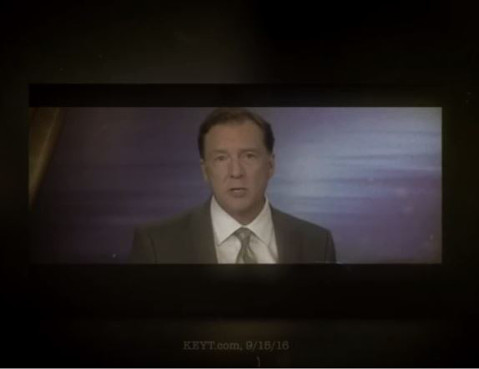Carbajal Threatens Legal Action over Campaign Ad
Claims False Statements Made by Fareed in Ad for Congressional Run

Earlier this week, Democratic Congressional candidate Salud Carbajal demanded that TV stations KEYT and KSBY “cease and desist” from running a political ad paid for by the campaign of Carbajal’s Republican rival Justin Fareed that Carbajal’s attorneys claim is “false and defamatory.” The ad took Carbajal — a county supervisor — to task for approving multiple pay increases for county supervisors. Attorneys for the television stations replied that the decision to pull the ad or not is up to Fareed; Fareed’s campaign attorney, Chuck Bell of Sacramento, refused, insisting the ad in question is “factually accurate” and “not defamatory as a matter of law.”
The ad features the voice of a woman narrator — snarkier than usual even by the standard of most negative ads — speaking to Carbajal directly, mocking a television commercial he’d run earlier in the campaign in which he took credit for “leadership” and “sacrifice” because he voluntarily took a pay furlough at the same time county workers were forced to do so due. “Sacrifice, Salud? When you voted over and over to increase your own salary, then made your salary increases automatic … ?” the Fareed ad ran.
As a matter of fact, Carbajal did vote for two pay increases — one in 2006 and one in 2004. But contrary to the ad’s assertion, he voted against a proposal this July to make supervisors’ pay increases automatic. It was Carbajal who made the motion to reject automatic pay increases, as had been proposed by a special ad hoc committee formed of community and business leaders created to study supervisorial compensation. On the table was a one percent pay hike, which — as many supervisors noted — would increase their pay by $32 a week.
Lawsuit Threatened
In a letter dated October 25, Carbajal’s campaign attorney George Yin objected, “Our client respects the First Amendment and the rights of citizens to engage in spirited debate and criticism, but we cannot allow Mr. Carbajal’s character and reputation to be assailed by the repeated broadcast of false and defamatory claims.” Failure to respond, Yin stated, “will result in our pursuing all available legal remedies, including the commencement of legal action against you.”
In a recent televised interview with KSBY, Fareed stated that if elected, he would introduce legislation that would hold candidates accountable for defamatory ads.
After being alerted that Fareed had no intention of complying, Carbajal’s attorney said he and the campaign would review their options.
As a matter of law, the courts traditionally afford candidates wide latitude to say what they please against each other in the interest of free speech; factual accuracy, the courts have ruled, is best left to the candidates and the voters to hash out. Two years ago, Republican Congressional candidate Chris Mitchum sued incumbent Democrat Lois Capps, charging she defamed him by quoting him so out-of-context that it made him appear that he had no intention of representing the district he hoped to serve. His lawsuit was ultimately dismissed.
In that case, Capps used only a portion of a comment made by Mitchum, in which he stated he wasn’t going to Washington, D.C., to “represent the district” to secure federal funds to build new baseball fields or other bring-home-the-bacon projects, but rather to represent the principles of the founding fathers. Capps’s ad had Mitchum stating only that he wasn’t going to represent the district.
Pay Increases Problematic
In the case of Fareed’s ad, Carbajal did in fact vote two times in 10 years to increase the salary and benefits paid to the county supervisors. A recent study produced by an ad hoc committee of county movers, shakers, and business leaders concluded that Santa Barbara’s supervisors were paid 30 percent less on average than comparable peers. In Santa Barbara, supervisors are paid a base salary of $84,200 a year, plus benefits and mileage perks, bringing the total cost to taxpayers to $138,000 a year. That’s roughly half what an average county department heads is paid, and less even than an average (non-executive) county manager.
The prospect of county supervisors voting to give themselves pay increases is politically awkward. As a result, pay increases have been few and far between. The same ad hoc committee recommended that the supervisors receive annual pay increase linked to the cost of living. That issue came to a vote this July, and the deliberations were relatively brief and strained. Carbajal made a motion to reject the automatic pay increase provision, at least for the current year. No one voted in favor of the automatic pay increases.
This year’s Congressional race has seen bump in such cease-and-desist demands involving television ads. In the primary, Santa Barbara Mayor Helene Schneider — then running for the Democratic nomination — demanded Carbajal pull ads he was then running, complaining they painted an unduly rosy picture of the county’s financial picture. No lawsuit, however, was threatened or filed.

More recently, KEYT filed a cease-and-desist demand to the Fareed campaign, claiming that the unauthorized use of a portion of a news telecast — a report on Carbajal’s disparaging remarks describing Lompoc as the “armpit” of the county — dragged the station into a partisan posture in the race when, in fact, it was assiduously neutral. The use of news clips by political candidates in political ads is as common as their use of hyperbole and exaggeration. The Fareed campaign not only refused to pull the ads, but it issued a counter-claim against KEYT, charging that its claims to being neutral were, in fact, untrue.
Previously, the Fareed campaign issued a demand for retraction against The Santa Barbara Independent, suggesting that an article about the large number of campaign dollars coming from outside the district from individuals associated with skilled nursing home chains implied that Fareed had broken the law. The offending passage of that article sought to clarify what campaign donation practices were legal and which ones were not. Additional language was added to highlight that point. As a political candidate, Fareed is by law a public figure and as such enjoys less protection against inaccurate or misleading news coverage. In that instance, Fareed argued that he suffered potential harm to reputation as a private businessperson.



